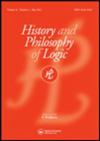具有多论证谓词的勒希涅夫斯基本体论
IF 0.5
3区 哲学
Q3 HISTORY & PHILOSOPHY OF SCIENCE
引用次数: 0
摘要
摘要Leśniewskian本体论(LO)是一个系统,其中基本主谓公式采用a b的形式,并表示一个自变量的预测,例如John是一名学生。在LO的语言中,没有给出允许结构表达的许多论证形式的谓词,例如,句子John is Anne的儿子。在这篇文章中,LO的一个简单而自然的扩展被建议包含许多自变量预测。这样得到的系统对应于多元二阶逻辑。本文章由计算机程序翻译,如有差异,请以英文原文为准。
Leśniewskian Ontology with Many-argument Predication
ABSTRACT Leśniewskian Ontology (LO) is a system in which the basic subject-predicate formula takes the form of a b and express one-argument predication, e.g. John is a student. In LO’s language, there is no many-argument form of predication given that would allow for the structural expression of, for example, the sentence John is Anne’s son. In this article, a simple and natural extension of LO is suggested to encompass many-argument predication. The system thus obtained corresponds to polyadic second-order logic.
求助全文
通过发布文献求助,成功后即可免费获取论文全文。
去求助
来源期刊

History and Philosophy of Logic
综合性期刊-科学史与科学哲学
CiteScore
0.80
自引率
0.00%
发文量
24
审稿时长
>12 weeks
期刊介绍:
History and Philosophy of Logic contains articles, notes and book reviews dealing with the history and philosophy of logic. ’Logic’ is understood to be any volume of knowledge which was regarded as logic at the time in question. ’History’ refers back to ancient times and also to work in this century; however, the Editor will not accept articles, including review articles, on very recent work on a topic. ’Philosophy’ refers to broad and general questions: specialist articles which are now classed as ’philosophical logic’ will not be published.
The Editor will consider articles on the relationship between logic and other branches of knowledge, but the component of logic must be substantial. Topics with no temporal specification are to be interpreted both historically and philosophically. Each topic includes its own metalogic where appropriate.
 求助内容:
求助内容: 应助结果提醒方式:
应助结果提醒方式:


